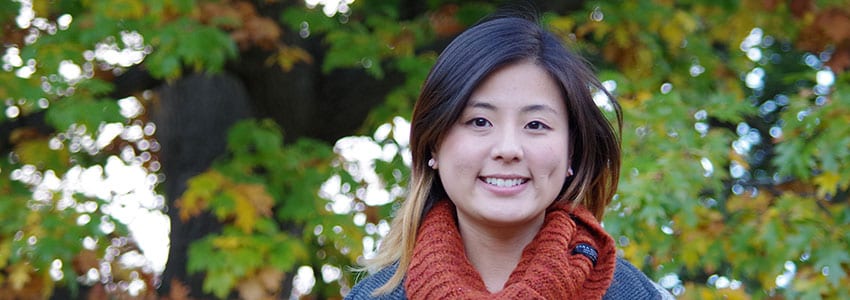Irene has two faculty advisors, Thomas Wilson and Thomas Glover, an atypical situation for doctoral candidates in the sciences. For her, having two advisors has been largely positive. “I get surprised every time: my faculty advisors are so different but they can work well together. They are almost like a second set of parents to me.”
Originally from South Korea, Irene moved to the United States when she was 11 so her father could attend graduate school. She moved across the country during her childhood from New York to California, then back to Cornell for her undergraduate studies in Biology and Philosophy. That’s when she thought she’d try the middle of the country, coming to Michigan to pursue a doctoral degree.
Irene’s research focuses on genome instability, which is an accumulation of mutations in the DNA. She describes, “Your DNA is composed of strings of letters made of A, T, G and C, and there are often mutations. Mutation could be anything from deleting or substituting a letter in a single strand or huge chunks or duplications of letters. I work on copy number variations, which change the ‘copy number’ of your DNA. You usually have two copies of your genes—one copy from mom and one from dad, and copy number variations, which are big deletions or duplications, change that number into something else. I study the mechanism that leads to copy number variations using cultured human cells as a primary model.”
“My research has been kind of a ride,” Irene admits. She worked on one of her advisors’ project when joining their labs and finally dug into her own project in her third year. She explains, “It was conceptually a very interesting project but technically challenging. I recently switched projects to a similar but more feasible one. All of us had a hard time letting it go.” She’s still developing the tools for her experiments, but is happily finding that things are moving a lot more quickly this time around.
Irene is currently collecting data and is planning to finish her dissertation within one to two years while spending her free time for career development. “I’m trying to a develop career path as much as I can. I’m thinking of pursuing a non-academic job. My advisors are supportive, but there’s only so much they can do to guide me. It has been rough making that transition from being a student who is passively taking advice from people in my lab and from my advisors to actively identifying who could be my alternative career mentor and other like-minded students on campus.”
What that path could be has a lot of options. Irene is interested in science communication and writing. She is a board member of an organization called Michigan Science Writers (or MiSciWriters for short) that, not surprisingly, focuses on science writing. Since they are a fairly new group, the executive members (who are advanced grad students) find themselves trying to navigate issues of a new group and still recruiting new younger leaders. She rounds out this interest as a reporter and editor for The Michigan Daily where she primarily covers research and medicine.
Irene says the unique environment of graduate school has taught her many different skills.
“Grad school is like a weird hybrid of working and being a student at same time. It is the best and worst of both worlds. I have learned a lot of science, but I also learned real world skills like how to deal with your boss, negotiate to pursue what you want, work in a team, and operate under different mentoring styles. These are very valuable tools. These skills are very applicable regardless of what I decide to do after finishing my Ph.D.” she shares.
Irene formed a lot of strong relationships with mentors and with friends in her various groups, which has ultimately motivated her to keep working hard. She adds, “The other writers at The Michigan Daily are mostly undergrads but it’s amazing how much I can learn from them, too. They can be a lot more energetic and passionate than some grad students. I think I lost a little of that after starting graduate school; you get busy and bogged down with so many real world problems.”
One of those problems stems from questioning whether to stay in academia after finishing her dissertation. She is currently exploring options that might include going back to school yet again: “I’m still exploring next steps and talking to a lot of people who are in my shoes or were in my shoes. Some science writers recommend that I pursue a certificate program or Master’s in science writing. What I can self-teach is pretty limited, and I know I’m ready to learn something, but I don’t know what. I feel the need for a mentor or guide to help me with what skills to learn, and the programs will be helpful in that regard. But first I need to know which direction to go. I’m still trying to decide if I would like to go the journalism route and work for a newspaper or a science magazine or in a communications department at a government agency like the NIH.”
“Only thing I can do at this point is talk to people.” Indeed, Irene does a lot of talking and writing – and not always about science. Irene says, “I noticed throughout grad school – and life in general – with the ubiquitous nature of social media, people often see other’s lives as perfect and don’t see the struggles they go through. I have felt very alone at times. I have felt symptoms of the imposter syndrome. Now I’m trying to talk about it as much as I can so others don’t feel so alone. Ultimately you need to navigate it yourself, but knowing you are not alone is often helpful enough to get you going.”

